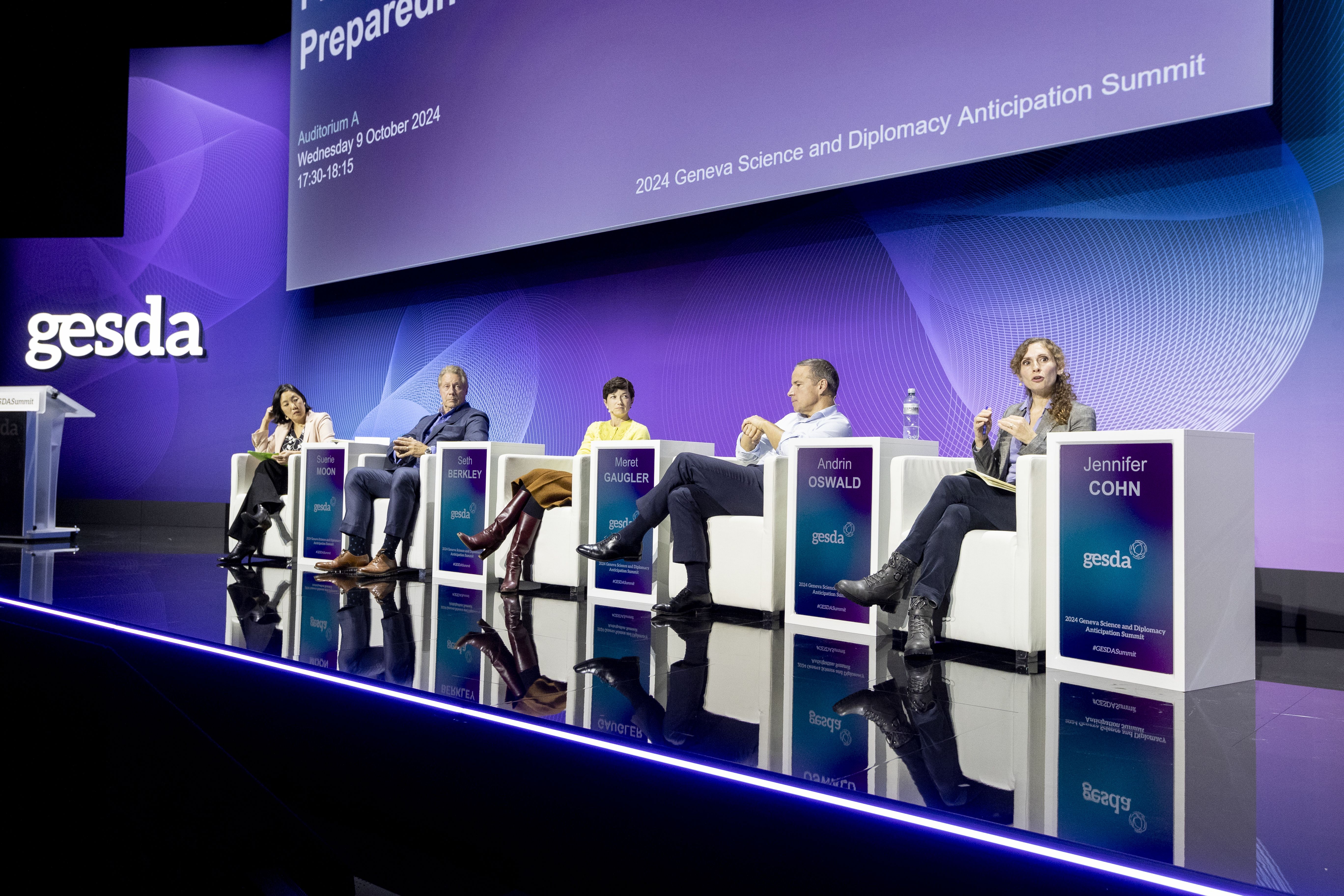Human Augmentation Highlight II: From the rise of drug-resistant disease-causing pathogens to the emergence and spread of new infectious diseases, global health security remains a top concern. What role can innovative business models play in enhancing progress on pandemic preparedness?
The following is the rapporteur report of an expert discussion held during the 2024 GESDA Summit. The author is a Villars Fellow.
Ideas from the Speakers
Learning from COVID-19 and the Economic Imperative
The session opened with a reflection on the devastating global impact of COVID-19, including an estimated $12 trillion in financial losses. The speaker stressed that, despite the scale of these losses, the world has moved on quickly, with little attention given to preparing for future pandemics. He emphasized that pandemic preparedness must remain a top public policy priority.
The speaker noted that the current momentum in vaccine preparedness marks a critical moment, driven by rapid scientific advances. However, this progress is being undermined by the growing politicization of public health, which hinders further development. He called for a shift in political mindsets, urging global leaders to prioritize collective funding, equitable manufacturing capabilities, and broader access to technology. He concluded by warning that while the science and technology are in place, the lack of political will remains a significant barrier.
Addressing Antibiotic Dependence and Sustainability
One speaker underscored the growing reliance on antibiotics, particularly in low-income countries, where even common infections are becoming difficult to treat. She emphasized the need for sustainable antibiotic use and innovation in production models.
The speaker proposed rethinking research and development through approaches such as nonprofit development programs and early licensing agreements. These measures could improve market efficiency, strengthen manufacturing capacity, and ensure equitable access to both major markets and small to medium-sized enterprises.
Politicizing Health Systems and Science
A speaker shared a personal experience from the COVID-19 pandemic, illustrating the extent to which global health systems have become politicized. Despite this challenge, he noted a silver lining: the pandemic spurred scientific advances and drove growth in health technology markets.
The speaker raised thought-provoking questions about the future of science, particularly whether new advances might make current technology transfer methods obsolete. He stressed the importance of forward-thinking policies to ensure that scientific progress translates into practical, real-world solutions.
Promoting Preparedness as Prevention
Another speaker focused on preparedness as a preventive measure rather than a reactive one. She noted that COVID-19 has shifted private capital’s perception of investment in pandemic preparedness, leading to greater interest from private investors. However, she emphasized the distinct yet complementary roles of public and private funding.
Public funding is crucial for securing manufacturing capacity and addressing market failures where private investors may be reluctant to engage. The speaker advocated for stronger public-private partnerships to support a balanced and sustainable approach to pandemic preparedness.
Addressing the Gap between Technology and Policy
The session moderator highlighted a recurring theme: although the technological tools for pandemic preparedness exist, political and regulatory frameworks have not kept pace. She stressed the need for international cooperation to address these gaps, particularly by developing harmonized regulatory systems and fostering trust among stakeholders.
Insights from the Audience
A key theme raised by the audience was the role of multilateralism in addressing global health challenges. Participants discussed how bilateral and multilateral relationships could be strengthened to make pandemic preparedness more operational and effective.
One audience member asked one of the speakers how young leaders could contribute to changing political mindsets. The expert responded by emphasizing the importance of building strong prevention systems and promoting long-term thinking. He acknowledged the widespread erosion of trust in institutions and political leadership, saying that rebuilding this trust requires transparency and concrete action.
Another participant mentioned the importance of involving the private sector in leveraging digital technologies for early warning systems and disease surveillance. Panelists agreed that while technology holds transformative potential, its impact depends on strong political commitment and meaningful community engagement.
The session underscored that pandemic preparedness requires an integrated approach, one that combines innovative business models, technological advances, and political reform. Key recommendations from the discussion included:
- promoting universal funding mechanisms and equitable manufacturing capabilities to address market failures
- encouraging public-private partnerships to mobilize resources and enhance efficiency
- streamlining regulatory processes and strengthening international collaboration to accelerate readiness
- rebuilding trust in institutions and leadership to encourage a culture of long-term thinking and sustained action
As one speaker noted, the science and technology needed are already in place. What’s lacking is a shift in mindset. The session served as a powerful reminder that pandemic preparedness is not only a scientific or economic matter but also a moral and political responsibility.







